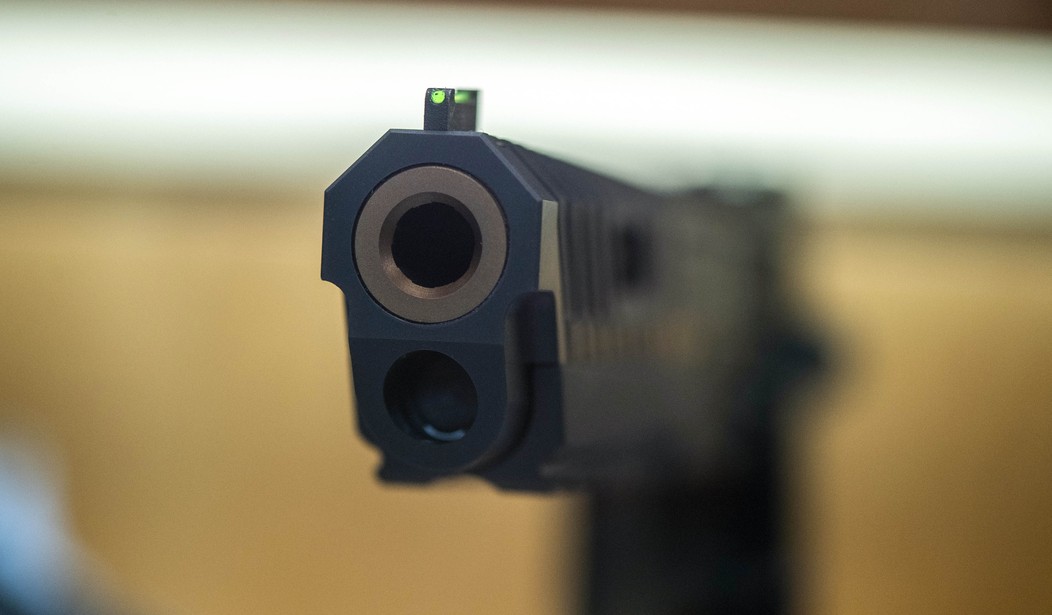The Atlantic is, in many ways, just like most of the mainstream media. They tend to push a progressive bias.
However, there are times when they seem to at least be trying to be neutral. For example, they acknowledged that buybacks don't actually work, for one thing, thus shattering a truth for many anti-gunners.
But, on the same token, they've taken plenty of anti-gun positions in the past as well.
To be honest, I can respect this. I don't need people to agree with me all the time or even some of the time, I just need them to at least try to be fair. Whether The Atlantic actually does or just makes it look that way remains to be seen, but they have shared our concerns before.
This is why I had to click on this piece about doctors asking about guns, in particular asking whether they should be asking if we have them.
Asking patients about access to firearms and counseling them toward responsible storage could be one part of that. “It’s the same way that we encourage people to wear seat belts and not drive while intoxicated, to exercise,” Emmy Betz, an emergency-medicine physician and the director of the University of Colorado’s Firearm Injury Prevention Initiative, told me. An unsecured gun could be accessible to a child, someone with dementia, or a person with violent intent—and mayincrease the chance of suicide or accidental injury in the home. Securely storing a gun is fundamental to the National Rifle Association’s safety rules, but as of 2016, only about half of firearm owners reported doing so for all of their guns.
Some evidence shows that when health-care workers counsel patients and give them a locking device, it leads to safer storage habits. Doctors are now trying to figure out the best way to broach the conversation. Physicians talk about sex, drugs, and even (if your earbuds are too loud) rock and roll. But to many firearm owners, guns are different.
Not so long ago, powerful physicians argued that if guns were causing so much harm, people should just quit them. In the 1990s, the director of the CDC’s injury center said that a public-health approach to firearm injury would mean rebranding guns as a dangerous vice, like cigarettes. “It used to be that smoking was a glamor symbol—cool, sexy, macho,” he told The New York Times in 1994. “Now it is dirty, deadly—and banned.” In the 2010s, the American Academy of Pediatrics’ advice was to “NEVER” have a gun in the home, because the presence of one increased a child’s risk of suicide or injury so greatly. (“Do not purchase a gun,” the group warned bluntly.) And when asked in 2016 whom they would go to for safe-storage advice, firearm owners ranked physicians second to last, above only celebrities.
And honestly, that's pretty much what I've encountered.
I once had an email conversation with a reader who was a physician. He responded to me commenting that it was never really appropriate for a doctor to ask about my guns, pointing out that yeah, there may be times. He was right. There are, such as when someone has suicidal ideations, for example.
But the truth is that the medical profession shot itself in the foot (pun fully intended) when it tried to reframe gun ownership as a vice, as something bad and wrong.
Cigarettes don't save lives. Much as I enjoy a quality bourbon, alcohol consumption generally doesn't either.
Guns do.
And, as a result, rather than conform to the medical establishment's desires, they simply painted themselves as unworthy of consideration on the topic.
Some have tried to right the ship, though.
For doctors, universal screening means “there’s no decision point of who you’re going to ask or when you’re going to ask,” Sandeep Kapoor, an assistant professor of emergency medicine who is helping implement the program at Northwell Health, told me. So far, Northwell’s trial has screened about 45,000 patients, which signals that the approach can be scaled up. Kapoor told me that with this strategy, gun-safety conversations could eventually become as routine for patients as having their blood pressure taken. When she was in primary pediatrics, Katherine Hoops, a core faculty member at Johns Hopkins’s Center for Gun Violence Solutions, worked firearm safety into every checkup, as she would bike helmets and seat belts. (The American Academy of Pediatrics still maintains that the safest home for a child is one without a gun, but the organization now recommends that pediatricians talk about secure storage with every family, and offers a curriculum on how to have this conversation.) Universal screening can also find people whom a targeted approach might miss: The team at Northwell recently learned through screening questions that a 13-year-old who came in with appendicitis had been threatened with guns by bullies, and brought in his parents, a team of social workers, and the school to help.
Admittedly, this is a better approach--and the American Academy of Pediatrics can get bent--because it doesn't seek to demonize guns and gun ownership, but on the same token, if they're asking, they're prying.
Simply passing along information is fine. I could see that as a good thing, so long as the advice isn't the idiotic advice I recently wrote about, again from a physician. But anything beyond that is a problem simply because the medical establishment has been antagonistic toward gun ownership and gun owners are willing to be antagonistic right back.
Let's be honest, the most docile in our world are the people who would take this prying without complain, but the most docile aren't he people ready to fight back against a home invader by getting a firearm in the first place.
We're a contentious bunch.
But a patient in the ER for a sprained ankle may understandably wonder why a doctor is asking about firearms. “There’s no context,” Chris Barsotti, an emergency-medicine physician and a co-founder of the American Foundation for Firearm Injury Reduction in Medicine, told me. The firearm community, he said, remembers when “the CDC wanted to stigmatize gun ownership,” so any movement for health care workers to raise these questions needs nuance. To his mind, these should be tailored conversations. Betz, of the University of Colorado, raises the question only when a patient is at risk, and believes that firearm safety can otherwise be in the background of a practice—for example, in a waiting room where secure-storagebrochures are displayed alongside pamphlets on safe sex and posters on diabetes prevention.
About half of firearm-owning patients agree that it’s sometimes appropriate for a doctor to talk with them about firearms, according to a 2016 study by Betz and her colleagues. They’re even more okay with it if they have a child at home. The physicians I asked said that the majority of the time, these conversations go smoothly. But Betz’s study also found that 45 percent of firearm-owning patients thought doctors should never bring up guns. Paul Hsieh, a radiologist and a co-founder of the group Freedom and Individual Rights in Medicine, wrote in an email that gun owners he’s spoken with “find the question about firearms ownership intrusive in a different way than questions about substance use or sexual partners.”
And the truth of the matter is that they are.
It's especially true if I'm in the doctor's office for a cold and they start asking me about guns. There's no way in hell I'm going to answer that question, at least not honestly. It's none of their business, especially since the odds are I know more about the safe handling of a firearm, how to store one, and pretty much anything else to do with one than they do.
In the end, The Atlantic doesn't answer the question. The author does point out that many gun owners find the subject invasive and that the medical profession's past antagonism toward gun ownership has poisoned the well.
The truth is that I believe the author has some sympathy toward the whole "public health approach" to gun deaths--and by that I mean suicides, accidents, and homicides in total--and if the healthcare industry would stay out of the gun control discussion, that would be easier for people like me to swallow.
Public health approaches in counseling those who have been the victims of gun violence or the survivors of someone who was killed in such, for example, could be beneficial. Working to make it easier for people to give their guns to friends when they're in distress would be a great help, too, though that practice is actually illegal in universal background check states.
There are things that most definitely could be done and that the healthcare community would be ideal champions of, but the truth is that they started demonizing guns completely and they haven't really stopped.
The Atlantic didn't answer the question of whether doctors should ask anything, so I will.
Without a pressing and specific reason to ask, the answer is no. My gun ownership is no one else's business unless I choose to make it so. The term "doctor" at the front of someone's name doesn't give them license to intrude, absent those pressing and specific reasons.
Asking when it's not warranted is a good way to get me to look for another physician.







Join the conversation as a VIP Member